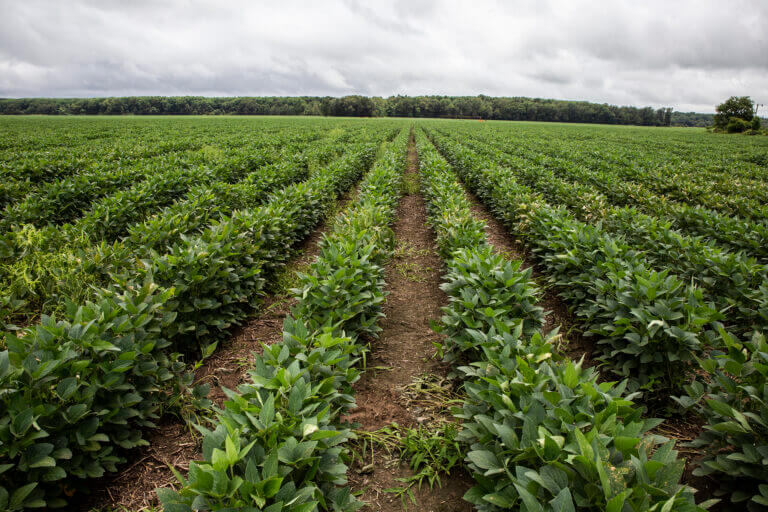

It’s been a disparate few years for Mississippi’s agriculture sector. Even as natural disasters and trade wars have caused row crop prices to decline, record high beef prices, growing poultry production and hundreds millions of dollars in federal disaster payments have bolstered the sector.
Some farmers have reported that federal payments have been slower and lower than needed as they continue to feel the impacts of bad weather in 2023 and 2024 exacerbated by low prices, high costs and trade wars. In Mississippi, row crops, which include soy beans, cotton and corn, have been among the hardest hit.
“This is one of the worst years for row crops,” said Joshua Maples, an agricultural economist at Mississippi State University.
Row crops, especially soybeans, are an important part of Mississippi’s economy with soybean production valued at over $1 billion. Farmers are still recovering from the effects of past severe weather conditions and the outlook for 2025 is not promising with higher than normal rainfall that may result in a lower crop yield.
The prices of row crops have declined since 2022 leading to smaller profits for farmers who are struggling to break even with high production costs. As a result of 2018 tariffs, China, the biggest importer of soybeans in the world, shifted to buying more from South America, a loss that the U.S. industry has not recovered from.
The bright spots in the agriculture industry have been the livestock and poultry industries. Poultry, the largest agriculture sector in Mississippi, grew by 10% according to data from the Mississippi State University Extension Service largely due to strong production.
But livestock saw the most growth, with a 14% increase.
“Livestock is the shining star of Mississippi,” said Mike McCormick, a cattle farmer and president of the Mississippi Farm Bureau Federation. Beef prices have soared due to historically low numbers of cattle in the United States. As of Jan. 1, 2025, there were 86.7 million head of cattle in the United States, the fewest since 1951.
While cattle farmers are currently seeing higher returns, they struggled for years with drought and weak profit margins leading to smaller herds. Farmers are trying to grow their herds but the process will likely take a few years, so beef prices will likely continue to be high.
In 2024, the state’s agricultural nominal GDP remained relatively unchanged with a decrease of 0.4% while the overall state GDP grew by 4.2%.
Agriculture GDP makes up around 2% of the state GDP. At the end of June, data from the Bureau of Economic Analysis showed that in the first quarter of 2025, Mississippi’s economy grew 0.7%. The agriculture sector was the largest contributor to growth of any industry at 0.83%. This was the third straight quarter that agriculture had the largest GDP growth rate in the state.
But agriculture GDP growth in the first quarter of this year was largely due to $120 million in direct payments from the federal government to Mississippi farmers.
“It’s not reflective of the reality farmers are facing right now,” said Andy Gipson, Mississippi’s agricultural commissioner on a recent episode of Mississippi Today’s podcast The Other Side, of what would appear on paper to be robust growth in farming output.
These payments are part of the American Relief Act that was passed in December 2024 that set aside more than $30 billion in direct payments to farmers to help with losses from economic changes and natural disasters. The money is being paid out through multiple programs, including the Emergency Commodity Assistance Program, or ECAP, and the Supplemental Disaster Relief Program, or SDRP. The commodity program helps farmers impacted by increased production costs and falling crop prices while the disaster program helps those affected by severe weather in 2023 and 2024.
“The $120 million is about 3.5% of the total GDP the state gained from ‘Agriculture, forestry, fishing and hunting’ in 2024,” said Dr. Sondra Collins a senior economist at the Mississippi Institutions of Higher Learning. She expects to see the impact of these programs on GDP throughout the year as applications continue to be submitted and money is paid out.
McCormick’s family has been farming in Mississippi since the 1820s and says this is one of the most challenging periods for farmers since the farm crisis of the 1980s.
“Farming has always been a risky business,” said McCormick.
- State Supreme Court considers reviving former Gov. Phil Bryant’s lawsuit against Mississippi Today over welfare scandal coverage - February 18, 2026
- Winter storm update: Mississippi still waiting on fed declaration for individual assistance, lawmakers crafting plan to fund recovery - February 18, 2026
- Shy of special session, Mississippi school choice appears dead - February 18, 2026